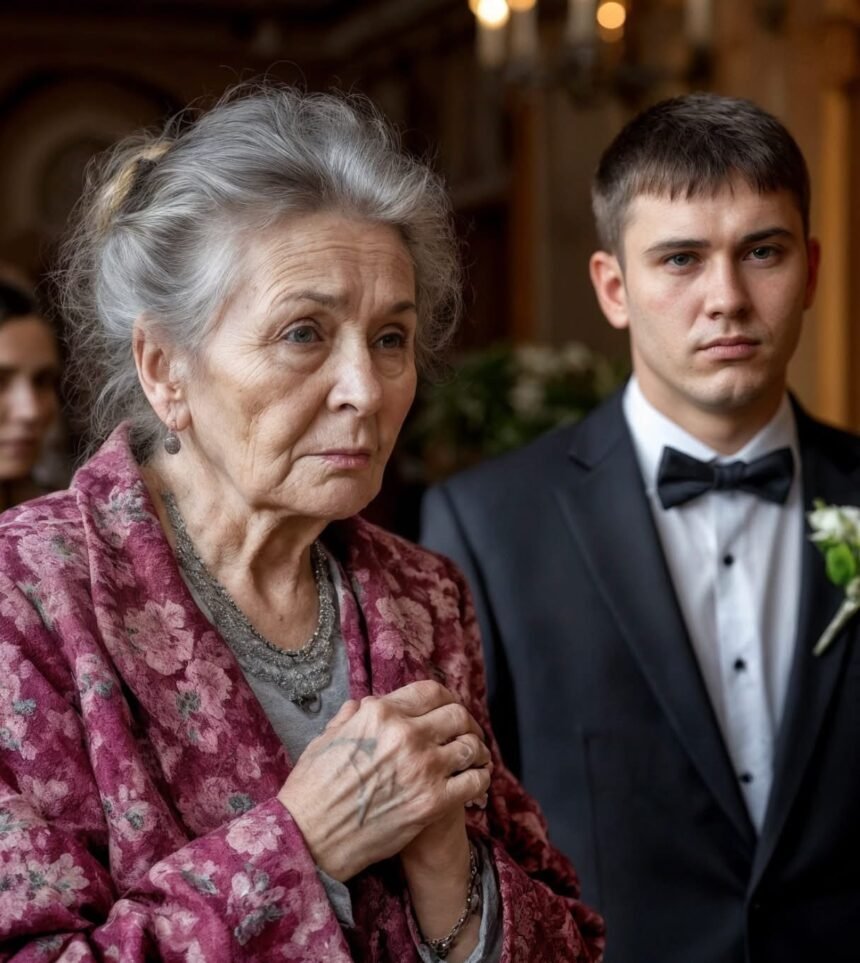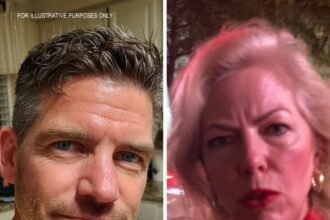Svetlana Petrovna stood by the half-open door, trying not to make a sound so as not to disturb the quiet of the moment.
She cautiously watched her son—Sasha, who, in a light suit and bow tie, looked like a movie hero.
His friends were helping him finish his look, and he remained calm, confident, almost majestic.
But something painful suddenly tightened in the mother’s chest.
It seemed to her as though she didn’t belong in this moment, as if she didn’t exist in this life at all.
As though no one was waiting for her, no one was calling her.
She absently adjusted the hem of her old dress, wondering how it would look with the new jacket she planned to buy tomorrow.
The decision was already made: she would go to the wedding, even without an official invitation.
But as soon as she took a step forward, Sasha suddenly turned around, as if he had sensed her gaze. His face changed.
He approached the door, closed it, and stayed inside the room.
“Mom, we need to talk,” he said, restrained but firm.
Svetlana involuntarily straightened up. Her heart beat faster.
“Of course, son.
I… I bought those shoes, remember the ones I showed you? And also…”
“Mom,” he interrupted, “it’s better if you don’t come tomorrow.”
For a moment, the world around her froze. Svetlana didn’t immediately understand his words—her mind seemed to refuse to accept them.
“Why?..” her voice trembled.
“I just wanted to be there… I…”
“It’s a wedding, mom. There will be people. And you… well, you just don’t look like everyone else.
And your job… I don’t want people to think I’m from some small town.”
His words fell like icy needles. Svetlana tried to argue:
“I’ve made an appointment with the stylist, I’ll do my hair, paint my nails… I have a modest dress, I…”
“Don’t,” he interrupted again. “Don’t ruin it.
You’ll still stand out. Please, just don’t come.”
He left without looking back. Svetlana was left alone in the dim room.
The silence pressed down on her like a heavy blanket. Even the clock seemed unusually muffled.
She sat still for a long time. Then, as if guided by an inner impulse, she stood up, took an old dusty box from the wardrobe, and carefully opened it.
Memories flooded out—of paper, glue, and long-past days.
The first page of the album. A photograph: a small girl in a crumpled dress stands next to a woman holding a bottle. Svetlana remembered that day well—her mother had shouted at the photographer, then at everyone around.
A month later, she lost her parental rights, and the little girl was placed in an orphanage.
Every subsequent picture felt like a blow. A group photo: children in matching clothes, no smiles. A cold look from the caretaker.
It was there she first learned what it meant to be unwanted. They beat her, punished her, left her without food. But she didn’t cry—she knew: they didn’t care for the weak.
Her youth was spent in a café on the outskirts of town.
A waitress uniform, long shifts, heavy trays. But it was freedom. She learned to take care of herself, pick clothes, sew skirts from cheap fabric, do her hair.
At night, she practiced walking in heels—just to feel beautiful.
And then one day—a coincidence. She spilled juice on a customer. The administrator yelled, and the people around were angry.
Svetlana lost control until she heard a voice:
“It’s just juice. An accident. Give the girl a chance to work.”
That’s how she met Viktor.
Tall, calm, in a light shirt. The next day, he brought her flowers. He simply placed them on the counter and said:
“I’d like to buy you coffee.
No strings attached.”
She sat with him on a bench in the park, drinking coffee from a plastic cup, and told him about herself. About her childhood, about her dreams, about how she dreams of a family. He listened, looked, smiled.
When he took her hand, something inside her turned over.
Such a simple gesture became the first real tenderness she had ever felt. After that, every visit from him felt like a holiday. He would say, “You’re beautiful.
Just be yourself.” And she believed him.
That summer was warm and long. For Svetlana, it was the brightest time of her life. She and Viktor went to the river, walked through the forests, sat in small cafés.
He introduced her to his friends—intelligent, kind, educated people. She was shy, felt out of place, but as soon as Viktor squeezed her hand under the table, the fear disappeared.
They loved watching sunsets on the roof—with a thermos of tea and a blanket to protect them from the evening chill. Viktor dreamed of working for an international company, but he said he didn’t want to leave his hometown forever.
Svetlana listened to him, holding her breath, memorizing every word. It seemed to her that everything was too fragile to be real.
One day, joking but with a serious tone, he asked:
“How would you feel about a wedding?”
Svetlana laughed, hiding her embarrassment. But inside, her heart screamed, “Yes!
Yes, a thousand times yes!” But she couldn’t say it out loud. She was afraid to disturb the silence of happiness, afraid it would disappear.
But someone else was already ready to shatter that illusion.
It all happened in the very café they often went to. At the table next to theirs, people were laughing loudly, someone accidentally knocked over a glass—and the next moment, an icy cocktail flew straight into her face.
Colored drops ran down her cheeks, staining her dress. Viktor jumped up, but it was too late.
At the neighboring table stood his cousin. Her voice trembled with rage and contempt:
“Is this your fiancée?
A cleaning lady? From an orphanage? You call this love?”
People watched.
Some snickered, some pretended
Doesn’t end here — it continues on the next page. Tap READ MORE to discover the rest 🔎👇





